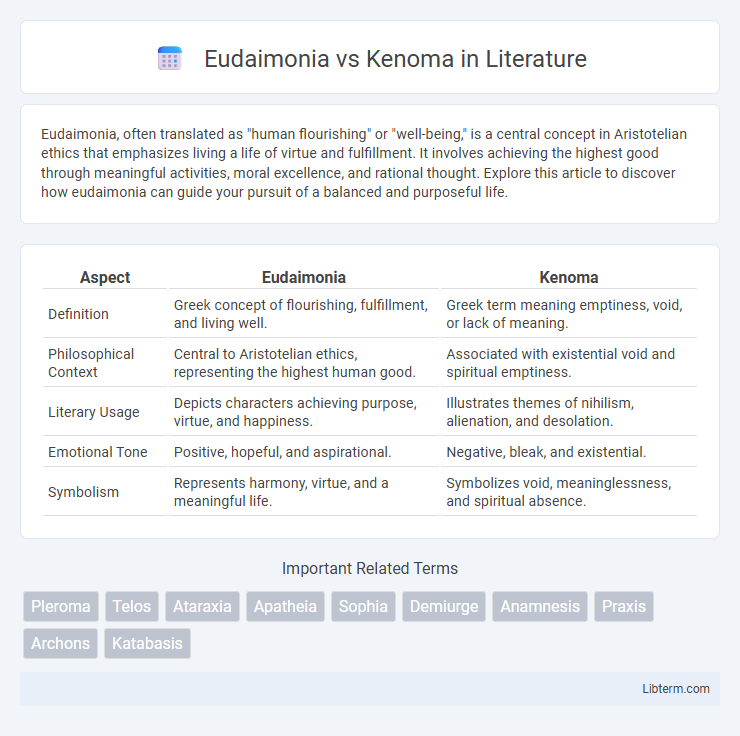Eudaimonia, often translated as "human flourishing" or "well-being," is a central concept in Aristotelian ethics that emphasizes living a life of virtue and fulfillment. It involves achieving the highest good through meaningful activities, moral excellence, and rational thought. Explore this article to discover how eudaimonia can guide your pursuit of a balanced and purposeful life.
Table of Comparison
| Aspect | Eudaimonia | Kenoma |
|---|---|---|
| Definition | Greek concept of flourishing, fulfillment, and living well. | Greek term meaning emptiness, void, or lack of meaning. |
| Philosophical Context | Central to Aristotelian ethics, representing the highest human good. | Associated with existential void and spiritual emptiness. |
| Literary Usage | Depicts characters achieving purpose, virtue, and happiness. | Illustrates themes of nihilism, alienation, and desolation. |
| Emotional Tone | Positive, hopeful, and aspirational. | Negative, bleak, and existential. |
| Symbolism | Represents harmony, virtue, and a meaningful life. | Symbolizes void, meaninglessness, and spiritual absence. |
Understanding Eudaimonia: The Pursuit of True Fulfillment
Eudaimonia, rooted in Aristotelian philosophy, represents the pursuit of true fulfillment through living a life aligned with virtue and rationality, contrasting sharply with Kenoma, which denotes emptiness or lack of purpose. Understanding Eudaimonia involves recognizing the importance of flourishing by cultivating wisdom, courage, and self-discipline to achieve lasting happiness. This concept emphasizes intrinsic well-being over external goods, highlighting the role of meaningful actions and personal growth in attaining authentic contentment.
Defining Kenoma: The Void and Spiritual Emptiness
Kenoma represents the concept of void and spiritual emptiness, often described as a state of existential lack or inner desolation. It contrasts sharply with Eudaimonia, which embodies fulfillment and flourishing, highlighting the psychological and metaphysical dimensions of human experience. Kenoma is frequently explored in philosophical and theological contexts as the absence of meaningful connection or divine presence.
Philosophical Roots: Eudaimonia in Ancient Thought
Eudaimonia, rooted in Aristotelian philosophy, represents flourishing and living in accordance with virtue, emphasizing reason and moral excellence as essential for true happiness. This concept contrasts sharply with Kenoma, derived from Gnostic thought, symbolizing emptiness or spiritual void, reflecting a disconnected existence from divine fullness. The philosophical roots of Eudaimonia prioritize the cultivation of personal and communal well-being through ethical living and purposeful actions.
Kenoma in Gnostic Philosophy: Origins and Interpretations
Kenoma in Gnostic philosophy represents the concept of emptiness or void, often contrasted with Eudaimonia, which signifies flourishing or true happiness. Originating from Greek cosmology and adapted in Gnostic texts, Kenoma embodies the material world's chaotic and deficient nature, reflecting a state of spiritual desolation. Interpretations of Kenoma emphasize its role as the realm of ignorance and entrapment, from which spiritual awakening and transcendence are necessary for the soul's return to divine fullness.
Eudaimonia vs Kenoma: Contrasting Concepts of Existence
Eudaimonia represents a state of flourishing and fulfillment, rooted in living authentically and actualizing one's potential, contrasting sharply with Kenoma, which denotes emptiness or a void of meaning. These opposing concepts underscore the dichotomy in existential experience where Eudaimonia embodies purpose and vitality, while Kenoma reflects existential emptiness and lack of significance. Philosophical traditions emphasize Eudaimonia's alignment with well-being and moral virtue, making it a cornerstone of meaningful existence unlike the nihilistic connotations associated with Kenoma.
Psychological Implications: Well-being vs Emptiness
Eudaimonia, rooted in Aristotelian philosophy, represents a state of flourishing and authentic well-being achieved through meaningful purpose and self-realization, which fosters psychological resilience and life satisfaction. In contrast, Kenoma denotes a sense of emptiness or void, often linked to existential alienation and a lack of fulfillment, contributing to feelings of anxiety, depression, and psychological distress. Understanding the dynamic between Eudaimonia and Kenoma aids mental health practices by emphasizing holistic wellness and the importance of meaningful engagement in life.
Modern Reflections: Eudaimonia and Kenoma Today
Modern reflections on eudaimonia emphasize flourishing through virtue, purpose, and meaningful engagement with life, contrasting sharply with kenoma's depiction of existential emptiness and disconnection. Contemporary philosophy and psychology often explore eudaimonia as a framework for well-being, resilience, and authentic happiness, while kenoma informs discussions about alienation, nihilism, and the void in postmodern existence. This dynamic tension highlights ongoing efforts to balance fulfillment and meaning against the pervasive sense of void experienced in modern society.
Strategies to Cultivate Eudaimonia in Daily Life
Cultivating eudaimonia in daily life involves practicing self-reflection to align actions with core values and purpose, fostering meaningful relationships that support growth, and engaging in activities that promote personal excellence and well-being. Incorporating mindfulness techniques and gratitude exercises enhances awareness of positive experiences and nurtures a balanced emotional state. Prioritizing purposeful goal-setting and ethical decision-making strengthens resilience against the emptiness associated with kenoma, leading to sustained happiness and fulfillment.
Recognizing and Overcoming Kenoma in Contemporary Society
Kenoma, representing emptiness or lack in contemporary society, often manifests as consumer dissatisfaction, social isolation, and existential void despite material abundance. Recognizing Kenoma involves identifying signs of psychological and emotional deficits that undermine genuine well-being and fulfillment. Overcoming Kenoma requires fostering eudaimonia through meaningful relationships, purposeful activities, and self-realization that promote holistic happiness and authentic living.
Integrating Eudaimonia: Pathways to Meaning and Inner Fulfillment
Integrating eudaimonia, the ancient Greek concept of flourishing through virtuous living and self-realization, offers a profound contrast to kenoma, which denotes emptiness and lack of purpose. Pathways to meaning and inner fulfillment emphasize authentic engagement with personal values, continuous growth, and a balanced life aligned with one's true nature. Embodying eudaimonia fosters psychological well-being, resilience, and lasting contentment, transcending the superficial void implied by kenoma.
Eudaimonia Infographic

 libterm.com
libterm.com